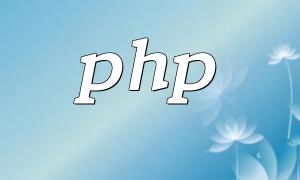Understanding and mastering PHP initialization features is crucial in the PHP learning process. This article provides a detailed analysis of the initialization process, including its definition, methods, and best practices, helping developers improve code maintainability and efficiency.
PHP initialization refers to the process of initializing variables and objects before the program begins execution. This process ensures that all parameters are correctly set up, providing a solid foundation for subsequent operations. It is essential for enhancing application stability and security.
There are several common methods of initialization in PHP. Below are a few commonly used approaches:
When defining variables, you can directly assign a default value for future use. Example:
<span class="fun">$variable = 'default value';</span>
When defining functions, you can assign default values to function parameters to avoid errors related to undefined variables:
<span class="fun">function exampleFunction($param = 'default parameter') { echo $param; }</span>When creating objects from a class, you can initialize object properties through the constructor, ensuring that the object starts in a valid state:
<span class="fun">class Example { public $property; public function __construct($value) { $this->property = $value; } } $example = new Example('initial value');</span>Following certain best practices can improve both the quality and readability of your code. Here are some recommended practices:
In PHP 7 and above, the null coalescing operator (??) provides a convenient way to assign default values to variables:
<span class="fun">$value = $_GET['value'] ?? 'default value';</span>
Using clear naming conventions when initializing variables can greatly improve code readability. For example, you might use prefixes or suffixes to indicate the status or purpose of a variable:
<span class="fun">$isInitialized = false; $defaultConfig = [];</span>
Avoid using global variables for initialization. Instead, use function parameters or class properties to pass and manage data, making the code more modular and maintainable.
PHP initialization features play a key role in the development process. Proper initialization not only enhances code robustness but also reduces debugging difficulty. By understanding different initialization methods and following best practices, developers can write clearer, more efficient code, improving the overall quality of their projects. We hope this article helps you understand PHP's initialization features more deeply and apply them effectively in practice.









